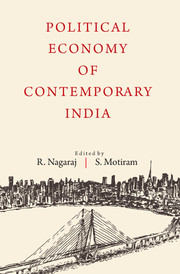Book contents
- Frontmatter
- Contents
- List of Tables and Maps
- List of Figures and Pictures
- Preface
- 1 Introduction: From ‘Intermediate Regime’ to Crony Capitalism
- Economy-wide Considerations
- Political Economy by Regions of India
- Urban Labour Markets
- Land and Rural Labour
- 9 Peripheral Agriculture? Macro and Micro Dynamics of Land Sales and Land Use Changes in the ‘Rural’ Economy of Kancheepuram
- 10 Infrastructures of Growth, Corridors of Power: The Making of the SEZ Act 2005
- 11 Land-based Financing for Infrastructure: What is New about India's Land Conflicts?
- 12 Political Economy of Land Acquisition and Resource Development in India
- 13 Advice and Dissent: The Federal Politics of Reforming India's Land Acquisition Legislation
- 14 ‘Workers’ or ‘Beneficiaries’: The Varied Politics of NREGA Implementation in South-West Madhya Pradesh
- About the Contributors
- Index
14 - ‘Workers’ or ‘Beneficiaries’: The Varied Politics of NREGA Implementation in South-West Madhya Pradesh
from Land and Rural Labour
Published online by Cambridge University Press: 08 February 2018
- Frontmatter
- Contents
- List of Tables and Maps
- List of Figures and Pictures
- Preface
- 1 Introduction: From ‘Intermediate Regime’ to Crony Capitalism
- Economy-wide Considerations
- Political Economy by Regions of India
- Urban Labour Markets
- Land and Rural Labour
- 9 Peripheral Agriculture? Macro and Micro Dynamics of Land Sales and Land Use Changes in the ‘Rural’ Economy of Kancheepuram
- 10 Infrastructures of Growth, Corridors of Power: The Making of the SEZ Act 2005
- 11 Land-based Financing for Infrastructure: What is New about India's Land Conflicts?
- 12 Political Economy of Land Acquisition and Resource Development in India
- 13 Advice and Dissent: The Federal Politics of Reforming India's Land Acquisition Legislation
- 14 ‘Workers’ or ‘Beneficiaries’: The Varied Politics of NREGA Implementation in South-West Madhya Pradesh
- About the Contributors
- Index
Summary
Introduction
The Mahatma Gandhi National Rural Employment Guarantee Act (NREGA hereafter) enacted by the Indian Parliament in 2005, created a legal, justiciable ‘right to work’ for all households in rural India. Adult members of all rural households were now eligible to ‘demand’ work on publicly funded worksites, for ‘at least’ a hundred days per household per financial year.
This chapter looks at how the text of rights defined under the NREGA interacts with a politics of claiming rights from the state. It draws on the work of the Jagrut Adivasi Dalit Sangathan (JADS), an indigenous people's collective working in Barwani district in south west Madhya Pradesh, examining the strategies adopted by members of the collective to seek work under the NREGA in the initial years after its implementation. Further, by using the example of Barwani district, the chapter highlights that NREGA implementation at the district level involves a varied set of institutional and civil society actors (Figure 14.1, annexed). It is suggested that novel rights defined under the NREGA can be drawn on for varied, and sometimes competing political agendas. It is argued, therefore, that the process of implementation of ‘rights’ under the NREGA is far from linear, and generates a new layer in the ‘production’ of local politics.
This chapter looks at the period between 2006 and 2009, i.e., the first three years of NREGA implementation. The empirical material presented in this paper draws on ethnographic field work, on letters and memoranda (or, gyapan) submitted by the JADS membership to the local state and other civil society organisations regarding implementation of public works programmes, and on secondary literature on the Government of Madhya Pradesh and the central government's role in NREGA implementation. The next section starts with a discussion on the Jagrut Adivasi Dalit Sangathan and strategies adopted by its members to claim work under NREGA. Section three discusses the engagement of the central government and the Government of Madhya Pradesh with NREGA implementation. Section four highlights the work of civil society actors other than JADS engaged in NREGA implementation in Barwani district, Madhya Pradesh, and section five is the concluding section.
- Type
- Chapter
- Information
- Political Economy of Contemporary India , pp. 331 - 362Publisher: Cambridge University PressPrint publication year: 2016



